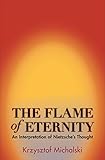The Flame of Eternity : An Interpretation of Nietzsche's Thought / Krzysztof Michalski.
Material type: TextPublisher: Princeton, NJ : Princeton University Press, [2011]Copyright date: ©2011Edition: Course BookDescription: 1 online resource (248 p.)Content type:
TextPublisher: Princeton, NJ : Princeton University Press, [2011]Copyright date: ©2011Edition: Course BookDescription: 1 online resource (248 p.)Content type: - 9780691162195
- 9781400840212
- Eternal return
- Eternity
- PHILOSOPHY -- General
- PHILOSOPHY / General
- Apocalypse
- Gospel of Matthew
- Jesus Christ
- Nietzsche
- Phaedo
- Plato
- Socrates
- Zarathustra
- chance
- child at play
- concepts
- contemporary culture
- death
- deception
- diversification
- divinity
- envy
- eternal love
- eternity
- evil
- falsehood
- fire
- good
- grazing cows
- guilt
- history
- human certainty
- human condition
- human life
- human nature
- humanity
- knowledge
- life
- lived moment
- love
- memory
- modern science
- moral concepts
- morality
- morals
- necessity
- negation of life
- nihilism
- nihilistic culture
- overman
- passing
- peace
- philosophy
- power
- rationality
- reason
- rejection
- relativistic culture
- science
- serenity
- suprahuman
- time
- will to power
- 193 23
- B3318.E88 M5313 2017
- online - DeGruyter
- Issued also in print.
| Item type | Current library | Call number | URL | Status | Notes | Barcode | |
|---|---|---|---|---|---|---|---|
 eBook
eBook
|
Biblioteca "Angelicum" Pont. Univ. S.Tommaso d'Aquino Nuvola online | online - DeGruyter (Browse shelf(Opens below)) | Online access | Not for loan (Accesso limitato) | Accesso per gli utenti autorizzati / Access for authorized users | (dgr)9781400840212 |
Frontmatter -- Contents -- Preface -- 1. Nihilism -- 2. Time Flows, the Child Plays -- 3. Good and Evil, Joy and Pain -- 4. Reason, Which Hurts -- 5. The Time Is at Hand -- 6. The Death of God -- 7. The Flame of Eternity -- 8. Eternal Love -- 9. Our Insatiable Desire for More Future: On the Eternal Return of the Same -- Notes -- Index
restricted access online access with authorization star
http://purl.org/coar/access_right/c_16ec
The Flame of Eternity provides a reexamination and new interpretation of Nietzsche's philosophy and the central role that the concepts of eternity and time, as he understood them, played in it. According to Krzysztof Michalski, Nietzsche's reflections on human life are inextricably linked to time, which in turn cannot be conceived of without eternity. Eternity is a measure of time, but also, Michalski argues, something Nietzsche viewed first and foremost as a physiological concept having to do with the body. The body ages and decays, involving us in a confrontation with our eventual death. It is in relation to this brute fact that we come to understand eternity and the finitude of time. Nietzsche argues that humanity has long regarded the impermanence of our life as an illness in need of curing. It is this "pathology" that Nietzsche called nihilism. Arguing that this insight lies at the core of Nietzsche's philosophy as a whole, Michalski seeks to explain and reinterpret Nietzsche's thought in light of it. Michalski maintains that many of Nietzsche's main ideas--including his views on love, morality (beyond good and evil), the will to power, overcoming, the suprahuman (or the overman, as it is infamously referred to), the Death of God, and the myth of the eternal return--take on new meaning and significance when viewed through the prism of eternity.
Issued also in print.
Mode of access: Internet via World Wide Web.
In English.
Description based on online resource; title from PDF title page (publisher's Web site, viewed 29. Jul 2021)


